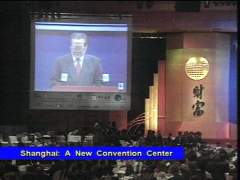 In this edition, we will turn to China's largest industrial and commercial city-- Shanghai, in east China, to see its flourishing overeseas enterprises and examine its potential to become a new convention center in Asia.
In this edition, we will turn to China's largest industrial and commercial city-- Shanghai, in east China, to see its flourishing overeseas enterprises and examine its potential to become a new convention center in Asia.
Nearly 300 multinationals from the Fortune 500 invest in Shanghai, of which over 60 multinationals have set up their China headquarters in Shanghai.If you look at the buying power in Shanghai and the ten provinces surrounding Shanghai, it would be more than 60 percent of many company's revenues in China. And through hosting the upcoming APEC Ministerial meeting and the 9th Informal APEC Economic Leaders Meeting, Shanghai is building its global image as a top convention center.Shanghai is becoming more and more important for business meetings and conferences worldwide.
In 1990s,Shanghai attracted more and more international attention from worldwide investors. In the year 2000 alone, 5 multinationals moved their headquarters from other major cities in China to Shanghai. The city is now the China headquarters for over 60 multinational companies. What is the reason behind this and how can Shanghai make further efforts in this area?
As the capital of China, Beijing has attracted a lot of foreign direct investment during the early stages of China's reform. Overseas companies regarded the relationship with the government as the priority when they first arrived in China, especially in those highly regulated industries such as telecommunications, finance, or gasoline and pharmaceutical.
Yin Xudong, Project Leader of Boston Consulting Group, said: "Basically until about in 1993, Beijing was still the most favored city for multinationals to set up their headquarters. The reason we think is very simple, because at that time,most companies thought that the relationship--dealing with the government relationship was an important function for the headquarters. So they had to be in Beijing, to be close to the central government and the ministries."In 1993, foreign direct investment in Beijing and Shanghai both reached 4 billion US dollars. After that, investment in Beijing dropped while Shanghai was coming in . Many foreign investors started finding local partners in Shanghai to establish joint ventures.

Dominigue de Boissenson, Chairman and CEO of Alcatel China Investment, said: "It was initially open in Beijing, and the big move far in Shanghai came with the decision to make first joint venture there. It was established in Beijing in 1992, and in 1996,it was decided that a small office built in Shanghai.We as well at the time thought to donate joint ventures in Sanyo, so it made more sense to have headquarters to be located in Shanghai as well." At the same time, some multinationals, especially those in consumer goods, have moved their headquarters from Hong Kong to Shanghai. Their products depend on the massive mainland market and Shanghai area is an important part of it.
Charles Chyi, President and Board Director of Heinz-UFE,said: "Currently we divided China into 6 sales territories, so Shanghai forces into our eastern region. Eastern region basically enjoys 28% of our total revenue. So it is quite an important region for us."
Yin Xudong, Project Leader of Boston Consulting Group, said: "If you look at the buying power of the 10 provinces surrounding Shanghai, it would be more than 70% of many companies revenue in China, so that's a very important reason why companies want to be in Shanghai."
Statistics from the Shanghai Foreign Investment Working Committee show that there have been 254 multinationals from Fortune 500 investing in Shanghai. Over 60 multinational companies have set up their Asia-Pacific headquarters in Shanghai, like Kodak from United States, and Alcatel from France.
(Graphics)254 multinationals from Fortune 500 invest in Shanghai;

Over 60 set up China Headquarters in Shanghai ;
Source: Shanghai Foreign Investment Working Committee
Henri Petit, Chairman and President OF Kodak Great Asia, said: "In 1998, we moved the headquarters of our Great Asia region from Hong Kong to Shanghai, because we felt that...because of the strong manufacturing base that we have in China, as well as the importance of the China market for Kodak, it was important to be based here in Shanghai." The cost for business in Shanghai is lower than that in Beijing. For example, Beijing rent is 30 to 50 percent higher for Grade A Offices. And what is more, overseas investors seem to be most keen on the Shanghai's personnel.Henri Petit said:: "It's clear that, for Kodak, the most important assets that we have are our people. Here in Shanghai, Kodak has found both marketing a big size as well as talented people a big amount, for example, software engineers. We have found that Shanghai was an excellent base to have strong skilled people.
Yin Xudong, Project Leader of Boston Consulting Group, said:"When we talk to some powerful clients which are multinational companies, it is very apparent that it is easier to combine expert managers to move into Shanghai compared to some other cities. And also it is easier to get local talents here." A multinational company should at least have 50 to 200 local professionals when they consider the area headquarters to be moved. In many sectors, Shanghai can now fulfill that demand. Many companies have even set up their global R&D center in Shanghai. But on the other hand, Shanghai still lacks experienced talents in service industries like banking and brokerage. That may be the reason why some of them still only have run offices in Shanghai.Shanghai previously was a financial and economic center in attracting investors, hopefully Shanghai's rapid growth reports to be the capital of western multinationals in Asia, surpassing other cities including Hong Kong, Singapore, and so on.
Hosting high-level international conferences is a relatively new business in China. But as a young industry, it has seen amazing early growth in China's largest industrial and commercial center---Shanghai. From the Fortune Global Forum held there in 1999 to this year's high profile annual APEC meeting, the city has great potential for becoming a new convention center both in China and Asia.

The Fortune Global Forum 2001 closed in Hong Kong. The event not only put Hong Kong in spotlight but also put in a huge fortune in ticket revenue. According to China Daily, the ticket revenue is expected to earn for the sponsors more than 3 million US dollars. What donations contributed by the corporate elite could amount to several times ticket income.As Hong Kong wins world's attention by hosting Fortune Global Forum, Shanghai is building its image as a new top convention center in Asia through hosting the upcoming APEC ministers meetings, and 9th formal APEC economic meeting. In fact, the city convention market has been booming in recent years. The Fortune Global Forum 1999, Asia Societies Annual Corporate Meeting for summit of Shanghai 5, and APEC annual meetings all clearly indicate that Shanghai is becoming increasingly popular venue for high level international conferences and exhibitions.
Yang Guoqiang, Deputy Director-General of Shanghai Foreign Affairs Office, said:"A lot of important meetings soon will be held in Shanghai, for instance, the APEC meeting, everyone now knows that, there will be quite a few important meetings to be held in Shanghai, altogether in China this year we host over 20 meetings related to APEC. While Shanghai will host over 10 of them and the highest level meeting for world leaders of APEC economics which will be held from 20th to 21st of October." As more and more international events choose Shanghai as its destination. The number of conferences and exhibitions held in the city has risen to over 10 per year. Shanghai is rapidly building as one of the best locations for high level conferences and exhibitions.
Joe Mariguit, Montgomery Network,said:" the city has vision to behold one of the great exhibition annuals in the world. In the last 5 years, the city has taken massive infrastructure development program. Hosting conferences and exhibitions is a direct way of promoting services in the products to consumers; it also creates business opportunity for other industries.
Xia Guoliang, Convention & Exhibition Expert, said: "In terms of Shanghai economy, if one yuan produced from an exhibition, 10 or 15 yuan will be turned out from related industries, such as logging, shopping, and entertainment. Let's do a calculation, if Shanghai holds 200 exhibitions and turns out 300,000 yuan for each one. Then 60 million yuan will be added to the local economy each year. That means related industries will earn in total about 900 million yuan.
According to industry resources, the city hosted 146 international conferences and about 200 international exhibitions in 2000. Figures also indicate that international arrivers to Shanghai exceeded 1.8 million last year while tourism income totaled 1.5 billion US dollars.

Yang Guoliang, Deputy Director-General of Shanghai Foreign Affairs Office, said: "Through all these conferences and meetings, you know, all these business leaders gather in Shanghai. While they have meetings here, they can visit Shanghai, they can understand what Shanghai is doing and how Shanghai is being boomed and be developed in last 10 years, and we said picture is worthy than a thousand words."
Shanghai enjoys a unique location of being a transportation hub in eastern China as well as in eastern Asia. It means Shanghai has an excellent opportunity to play a leading role in global convention business. As the host city of 2001 APEC meetings, Shanghai is preparing itself for reputation of the world central convention city.
Now we come to the end of this edition of China Business Guide.Thanks.
|